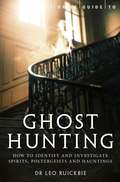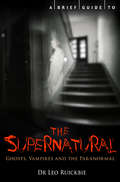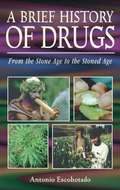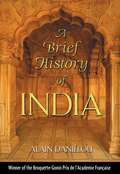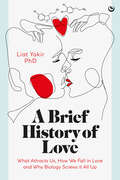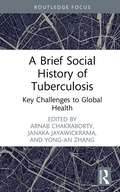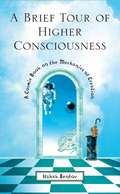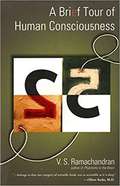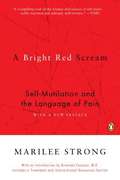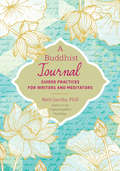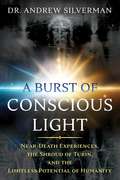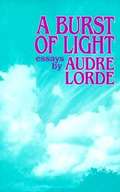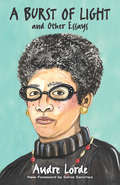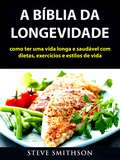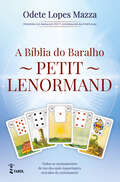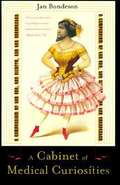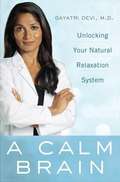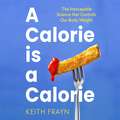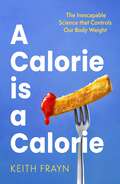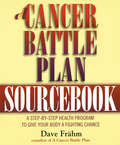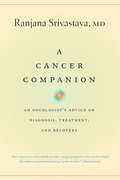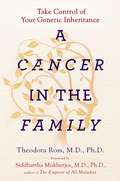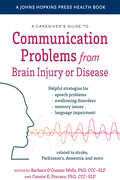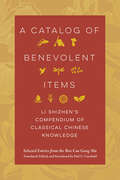- Table View
- List View
A Brief Guide to Ghost Hunting: How to Investigate Paranormal Activity from Spirits and Hauntings to Poltergeists (Brief Histories)
by Leo RuickbieThere has been an upsurge in books, television programmes, films and websites exploring the reality or otherwise of the spirit world. Not since the founding of The Ghost Club in 1862 and the Society for Psychical Research in 1882 has ghost hunting been so popular. Television and the internet, in particular, have fueled this new level of interest, creating a modern media phenomenon that spans the globe. But while the demand for information is high, good information remains scarce. A Brief Guide to Ghost Hunting leads us through the process of ghost hunting, from initially weighing the first report, to choosing equipment, and investigating and identifying the phenomena, with an analysis of the best places to go looking, methods of contacting the spirit world, how to explain paranormal activity and, crucially, how to survive the encounter. However, it is also a book about ghost hunting itself, drawing on 130 years of research in the cavernous archives of the Society for Psychical Research and even older history to find the earliest ghost stories. A Ghost Hunting Survey makes use of interviews with those billing themselves as ghost hunters to find out their views, motivations and experiences. New and original research makes use of statistics to map the nebulous world of apparitions while a Preliminary Survey of Hauntings offers an analysis of 923 reported phenomena from 263 locations across the UK.This is, as far as possible, an objective presentation of ghosts and ghost hunting. It is no wonder that mainstream science largely refuses to deal with the subject: it is too complicated. Without trying to convince you of any viewpoint, this book is intended to help you understand more.
A Brief Guide to the Supernatural: Ghosts, Vampires And The Paranormal
by Leo RuickbieFrom Most Haunted to Buffy the Vampire Slayer, from Underworld to Twilight, from Doom to Resident Evil, The Brief Guide to the Supernatural goes in search of the unearthly with unexpected results; combining history, science, psychology and myth he explores the allure of the paranormal - why so many people still believe in ghosts and angels - as well as the many ways people have tried to contact and record the impossible.
A Brief Guide to the Supernatural: Ghosts, Vampires and the Paranormal (Brief Histories)
by Leo RuickbieFrom Most Haunted to Buffy the Vampire Slayer, from Underworld to Twilight, from Doom to Resident Evil, The Brief Guide to the Supernatural goes in search of the unearthly with unexpected results; combining history, science, psychology and myth he explores the allure of the paranormal - why so many people still believe in ghosts and angels - as well as the many ways people have tried to contact and record the impossible.
A Brief History of Drugs: From the Stone Age to the Stoned Age
by Antonio EscohotadoThis fascinating book examines the instrumental role drugs have played in our cultural, social, and spiritual development from antiquity to the present.
A Brief History of India
by Alain Daniélou Kenneth F. HurryDaniélou's powerful rebuttal to the conventional view of India's history, which calls for a massive reevaluation of the history of humanity• Explores historical occurrences from each major time period starting with the first appearance of man 30,000 years ago• Couples the clarity and perspective of an outsider with the unique and specific knowledge of an insider• By the internationally recognized Hindu scholar and translator of The Complete Kama Sutra (200,000 copies sold)Alain Daniélou approaches the history of India from a new perspective--as a sympathetic outsider, yet one who understands the deepest workings of the culture. Because the history of India covers such a long span of time, rather than try to create an exhaustive chronology of dates and events, Daniélou instead focuses on enduring institutions that remain constant despite the ephemeral historical events that occur. His selections, synthesis, and narration create a thoroughly engaging and readable journey through time, with a level of detail and comprehensiveness that is truly a marvel.Because of the continuity of its civilization, its unique social system, and the tremendous diversity of cultures, races, languages, and religions that exist in its vast territory, India is like a history museum. Its diverse groups maintained their separate identities and never fully supplanted the culture and knowledge of their predecessors. Even today one may encounter in India primitive Stone Age people whose technology has remained at what is considered prehistoric levels. Thus Daniélou's examination of India reveals not only the diversity and historical events and trends of that country, but also the history of all mankind. Through Daniélou's history of India we learn from whence we came, what we have discovered over the years in the fields of science, arts, technology, social structures, religions, and philosophical concepts, and what the future may hold for us.
A Brief History of Love: What Attracts Us, How We Fall in Love and Why Biology Screws it All Up
by Liat YakirIs love about chemistry or do biology, evolution and psychology all have a part to play?Love is one of the most complex and confusing emotions in the human experience. It consumes so much of our lives and yet we don&’t truly understand it – what it is on a biological, chemical and evolutionary level. This book takes you on a fascinating journey to explore the science of love, looking closely at the interplay between genes, hormones, emotions and relationships.Discover everything you need to know about why you are attracted to certain people, the brain&’s role in your emotions, how to pick &“the one&” and how to preserve that love over time. Learn how to have better, healthier and more loving relationships by understanding the inner workings of love in your body.
A Brief Social History of Tuberculosis: Key Challenges to Global Health
by Arnab Chakraborty Janaka Jayawickrama Yong-An ZhangA Brief Social History of Tuberculosis delves into the history of tuberculosis and its impact on human populations.Drawing on research and expert experiences, the three research chapters (3–5) will explore how the disease has affected communities throughout history, and how society has responded to the threat of tuberculosis over time. Tuberculosis has been a persistent and devastating force from the crowded cities of the Industrial Revolution to the present day. However, this book will argue that there is much to be learned from the successes and failures of past efforts to control the disease from a social perspective. By examining the history of tuberculosis, researchers and policymakers can gain valuable insights into the challenges of infectious disease control, as well as the social and political factors that shape our response to such challenges.This volume will focus on generating critical discussions among scholars, researchers, and policymakers: it will be informative, engaging, and an essential read for anyone interested in the history of medicine, public health, and the ongoing struggle against infectious diseases worldwide.
A Brief Tour of Higher Consciousness: A Cosmic Book on the Mechanics of Creation
by Itzhak BentovA lighthearted yet profound guide to the realms of higher consciousness and the ultimate nature of reality. • Explains some of the most difficult concepts of physics and heightened consciousness in ways that are easily understood. • Presents a model for the interaction of the universe and human thought that has profound implications for our future. All aboard for the excursion of a lifetime as Itzhak Bentov, the celebrated engineer, inventor, and mystic, takes you on a tour of the universe, pure consciousness, and all that lies beyond. Using comical sketches, simple metaphors, and his famous wit and humor, Bentov explains the nature of reality, points out the sights in Nirvana and the Void, and eventually takes you to a meeting with your higher self. Along the way, Bentov illuminates the Kabbalistic principles of number and sound, the meaning of cosmic shapes and symbols, the consciousness of devas, and the nature of the absolute. Ultimately, he shows that the universe and thought are inseparable, and that the thoughts of all human beings affect each other and in turn the whole universe--an idea with obvious and far-reaching implications. Anyone interested in the inner reaches of the mind, the greater structure of the cosmos, and the spiritual evolution of humanity will find A Brief Tour of Higher Consciousness an informed and delightful traveling companion.
A Brief Tour of Human Consciousness
by Vilayanur S. RamachandranHow can some people come to believe that their poodle is an impostor? Or see colors in numbers? Internationally acclaimed neuroscientist, V.S. Ramachandran, now shares his unique insight into human consciousness in an entertaining, inspiring, and intellectually dazzling brief tour of the ultimate frontier—the thoughts in our heads. A Brief Tour of Human Consciousness is made up of five investigations of the greatest mysteries of the brain. The first chapter shows how amputees feel pain in limbs they no longer have as it introduces the great revolution of our age: neuroscience. The second chapter walks through the way what we see determines our thoughts, and demonstrates the counterintuitive point that believing is in fact seeing. The third chapter takes a leap beyond cutting edge science to audaciously set out a general theory of beauty, explaining why, the world over, cultures have fundamentally similar notions of what is attractive. The fourth chapter explores the bizarre world of synesthetes, people who see colors in numbers, textures in smells, sounds in sights, and flavors in sounds. Finally, V. S. Ramachandran one of the foremost brain researchers in the world today, sums up the implications of the revolution in our understanding of consciousness, to make a fascinating argument about our essential sense of self and its distributed nature.
A Bright Red Scream: Self-mutilation and the Language of Pain
by Marilee StrongSelf-mutilation is a behaviour so shocking that it is almost never discussed. Yet millions of people all over the world are chronic self-injurers. They are people who use knives, razor blades, or broken glass to cut themselves and their numbers include Johnny Depp and the late Princess Diana. In this groundbreaking work - an essential resource for victims, parents and therapists - Strong explores this hidden epidemic through case studies, research from psychologists, trauma experts, and the cutters themselves. It is a compelling tour of the trauma and science of self-injury.
A Buddhist Journal: Guided Practices for Writers and Meditators
by Beth JacobsA guided journal that uniquely combines personal writing and meditation—two of the most beneficial self-help processes availableIn this book, Beth Jacobs—who has taught and written extensively on both Buddhist psychology and therapeutic writing—provides a variety of writing techniques and exercises that are matched with specific Buddhist meditation instructions and teachings. She describes meditation practices and Buddhist concepts along with writing exercises that bring the material to life. Writers will find exercises that deepen their experiences in general and writing in particular. Meditators will find Buddhist concepts clarified and techniques expanded. All readers will discover a laboratory of writing as experimentation, with structures that open ideas, break habits, and combine experience in novel ways.
A Burst of Conscious Light: Near-Death Experiences, the Shroud of Turin, and the Limitless Potential of Humanity
by Dr. Andrew SilvermanProvides evidence that human consciousness can never be reproduced and exposes the perils of artificial intelligence • Explains how consciousness transcends the brain and body through quantum theory and accounts of consciousness in the clinically dead • Shares scientific evidence of how the image on the Shroud of Turin was produced and connects these findings to evidence concerning near-death experiences • Reveals how consciousness cannot be reproduced by a machine and how attempts to do so threaten what makes us human Stephen Hawking once said that the unanticipated consequences of artificial intelligence will be the greatest threat to humanity&’s survival. In this book, Dr. Andrew Silverman reveals why the powerful consciousness of the human mind could never be manufactured and so cannot be reproduced with technology. Integrating extensive scientific research from three seemingly unrelated fields of study--quantum mechanics, near-death experiences, and the Shroud of Turin--Silverman reveals the pitfalls and perils of artificial intelligence and addresses the fundamentally flawed thinking that underlies it. Drawing on his work as one of the leading experts on the Shroud of Turin as well as research by scientists from NASA and Los Alamos, he shows how the image on the Shroud could only have been produced by a flash of light as intense as a nuclear explosion--a burst of light that occurred after the body was in the tomb. Sharing medical evidence of consciousness in people declared clinically dead, the author shows how the light of consciousness evidenced by the Shroud is also a consistent feature of most near-death experiences. Exploring the non-local nature of consciousness--how it transcends the physical brain and body, Silverman explains why the human mind cannot be reduced to a computer and examines what separates sentient beings from machines. He shows how getting caught up in the push for artificial intelligence and the technological quest for immortality--through the attempt to &“download&” our minds onto computers--will only lead us to devalue and erase what makes us unique and irreplaceable in this cold, dark universe: our humanity.
A Burst of Light
by Audre LordeIn 1984, feminist poet Lorde learned that her breast cancer had metastasized to the liver. The moving title section comprises a series of journal excerpts that both frighten and inspire: choosing not to have a biopsy, she instead treats the disease with a stay at the homeopathic Lukas Klinik in Switzerland, consultations with more traditional medical specialists and alternatives like self-hypnosis. Her lifelong battle against racism, sexism and homophobia has armed her with the resilience to resist cancer, and thus "A Burst of Light" becomes not only a chronicle of Lorde's fight against disease, but a view of one woman's sparring with injustice, whether the oppressors are the South African police, the American government or malignant cells within her own body. Although it rings out with passion, anger and hope, the lengthy title piece is sometimes rambling and repetitive. In refreshing contrast, three outstanding essays on black lesbianism, the parallels between South Africa and the United States, and lesbian parenting are politically specific and pithy. -Publishers Weekly
A Burst of Light: and Other Essays
by Audre Lorde Sonia Sanchez"The self-described black feminist lesbian mother poet used a mixture of prose, theory, poetry, and experience to interrogate oppressions and uplift marginalized communities. She was one of the first black feminists to target heteronormativity, and to encourage black feminists to expand their understanding of erotic pleasure. She amplified anti-oppression, even as breast cancer ravaged her ailing body." — Evette Dionne, Bustle Magazine Winner of the 1988 Before Columbus Foundation National Book Award, this path-breaking collection of essays is a clarion call to build communities that nurture our spirit. Lorde announces the need for a radical politics of intersectionality while struggling to maintain her own faith as she wages a battle against liver cancer. From reflections on her struggle with the disease to thoughts on lesbian sexuality and African-American identity in a straight white man's world, Lorde's voice remains enduringly relevant in today's political landscape. Those who practice and encourage social justice activism frequently quote her exhortation, "Caring for myself is not self-indulgence, it is self-preservation, and that is an act of political warfare." In addition to the journal entries of "A Burst of Light: Living with Cancer," this edition includes an interview, "Sadomasochism: Not About Condemnation," and three essays, "I Am Your Sister: Black Women Organizing Across Sexualities," "Apartheid U.S.A.," and "Turning the Beat Around: Lesbian Parenting 1986," as well as a new Foreword by Sonia Sanchez. "When I don't know what to do, I turn to the Lorde." — Alexis Pauline Gumbs, Bitch Media
A Bíblia da Longevidade: como ter uma vida longa e saudável com dietas, exercícios e estilos de vida
by Hiddenstuff EntertainmentVocê gostaria de ser capaz de ter uma vida mais longa e se livrar de doenças, desconfortos, inflamações, dores e depressões? Por muito tempo, técnicas de curas naturais têm sido utilizadas para tratar um grande número de enfermidades e para ajudar pessoas a viverem mais! O uso das técnicas de cura natural também pode ajudar com doenças crônicas, com seu sistema imunológico, níveis de energia, foco, felicidade geral e muito mais! Introduzindo os segredos dos professionais para viverem mais e se sentirem mais saudáveis do que nunca! Com décadas de estratégias testadas, este livro mostrará a você a maneira mais rápida e efetiva de curar seu corpo naturalmente para beneficiar seu bem estar! Você aprenderá a aumentar seu bem estar em apenas poucas semanas. Não apenas isso, mas você melhorará todos os aspectos de sua vida. Quer descobrir como as pessoas lidam com doenças crônicas e enfermidades? Você também pode aprender esses segredos isso e se permitir ser mas feliz e saudável. Este guia ensina técnicas comprovadas sem o uso de suplementos caros ou cursos. O que está incluído: - Viva mais; - Sinta-se mais saudável; - Remédios; - Vença doenças crônicas; - Tenha mais energia; - Durma melhor; - Supere enfermidades; - Nutrição; - O que você deveria saber; + MUITO MAIS! Se você quiser viver mais, ser mais saudável, curar enfermidades ou aumentar seu foco e bem estar, então, este guia é para você! → Volte para o topo da página e clique em “adicionar ao carrinho” para comprá-lo imediatamente ← Aviso legal: O(s) autor e/ou detentor(es) de direitos legais não alega(m), promete(m) nem garante(m) a precisão, perfeição nem suficiência dos conteúdos deste livro e expressamente não se responsabiliza(m) por erros e omissões aqui contidos. Esse produto deve ser us
A Bíblia do Baralho Petit Lenormand
by Odete Lopes MazzaO livro mais completo de sempre sobre o baralho Petit Lenormand, que ficará como um manual de referência. Todos os ensinamentos de um dos mais importantes oráculos da cartomancia, por uma das maiores especialistas no baralho Petit Lenormand, pioneira em Portugal. «Se há alguém que tem um conhecimento vastíssimo sobre o baralho Petit Lenormand é a Odete. Ela é uma professora. Este conhecimento não caiu do céu, ele vem da dedicação de muitos anos de estudo deste maravilhoso baralho. Aprendeu com os melhores e tornou-se uma das melhores, porque, apesar de ser muito intuitiva, a Odete estudou muitíssimo a ferramenta com que trabalha e com que ajuda tanta gente.» Vera Xavier, taróloga «Escritora experiente, a Odete Mazza é a referência sempre que se fala no baralho Lenormand - e todos os que trabalham nesta área conhecem o seu nome.» Rui Pereira, tarólogo e escritor
A Cabinet of Medical Curiosities
by Jan BondesonIn this book of amazing oddities, Jan Bondeson explores unexpected, gruesome, and bizarre aspects of the history of medicine. He regales us with stories of spontaneous human combustion; vicious tribes of tailed men; the Two-Headed Boy of Bengal; Mary Toft, who allegedly gave birth to seventeen rabbits; and Julia Pastrana, exhibited around the world as the Ape Woman. Bondeson combines an historian's skill in showing us our timeless fascination with the grotesque with a physician's diagnostic abilities, as he examines the evidence and provides likely explanations for these peculiar events. "Fascinating. . . . Well-researched and extensively illustrated with items from [Bondeson's] personal collection, it covers a wide range of medical monstrosities, and there is something for everyone. " â " The Lancet "Entertaining in the simultaneously creepy and amusing way of a carnival sideshow. . . . Bondeson is quick to acknowledge absurdity, and his wry humor, along with his strong personal judgments, spice up the book. " â " Publishers Weekly "Bondeson . . . regards his exhibits with a careful scientist's eye, discovering misinterpreted evidence, tragic genetic mutations, and, occasionally, outright fraud. " â " Library Journal
A Calm Brain: How to Relax into a Stress-Free, High-Powered Life
by Gayatri DeviIn a world filled with too many choices, oppressive technology, and relentlessly overbooked schedules--how do we achieve the calm we so desperately need? Our ancestors used the fight-or-flight mechanism to protect themselves from predators. Today, we use it to fend off daily crises. The result is chronic stress and a learned inability to be calm which, in turn, makes it impossible for us to perform at our peak. Now, Dr. Gayatri Devi shows how we can cultivate empowering, enduring calm by tapping into our body's vagus nerve--and utilize our hardwired, natural relaxation system. If you are suffering from migraines, neck pain, gastrointestinal upsets, sleeps deprivation--or are just trying to work through life's difficulties--Dr. Devi shows that you don't need more drugs, you need A Calm Brain. "For anyone who wants to take charge of the 21st century while remaining calm, focused, and productive--this is the book for you." --Henry S. Lodge, New York Times bestselling author of Younger Next Year
A Calorie is a Calorie: The Inescapable Science that Controls Our Body Weight
by Keith FraynWe all know someone who seems to eat very little yet cannot avoid weight gain, or someone who eats everything they like while remaining slim. Why? Is it the kinds of food we eat, and when? Are our hormones to blame? Could it be chemicals in our environment? Even specialists are now questioning our understanding of the forces that shape body weight, and we are all more confused than ever.In this book, Keith Frayn, one of the world's leading experts on metabolism, argues that all these challenges are distracting us from tackling the obesity problem in the only way it can be addressed: by rebalancing the disregarded message of 'calories in - calories out'.Taking readers on a deep dive into the real science of energy balance, he reveals how nutrition research has been plagued by the difficulty of really knowing what people are eating and doing; why it is unlikely that some nutrients are intrinsically more fattening than others; how supposed differences between people in the speed of their metabolism vanish in the laboratory; how energy balance is altered in obese people and people who have managed to lose weight; and why these responses - honed over millennia of evolution - make dieting so hard. With clarity and insights from expert research, Frayn provides a clear-eyed perspective on current trends mired in controversy and confusion: time-restricted eating, intermittent fasting, low-carb versus low-fat meal plans, high-protein breakfasts and other dietary trickery. In a world where desirable, energy-rich food is increasingly plentiful, and labour-saving gadgets widespread, it becomes more and more difficult to stick to the simple message of energy balance. But, as Frayn shows, we can reshape our lives and improve our health by going back to what we know about calories, rediscovering the benefits of a more active life, and getting smart about what we eat.
A Calorie is a Calorie: The Inescapable Science that Controls Our Body Weight
by Keith FraynWe all know someone who seems to eat very little yet cannot avoid weight gain, or someone who eats everything they like while remaining slim. Why? Is it the kinds of food we eat, and when? Are our hormones to blame? Could it be chemicals in our environment? Even specialists are now questioning our understanding of the forces that shape body weight, and we are all more confused than ever.In this book, Keith Frayn, one of the world's leading experts on metabolism, argues that all these challenges are distracting us from tackling the obesity problem in the only way it can be addressed: by rebalancing the disregarded message of 'calories in - calories out'.Taking readers on a deep dive into the real science of energy balance, he reveals how nutrition research has been plagued by the difficulty of really knowing what people are eating and doing; why it is unlikely that some nutrients are intrinsically more fattening than others; how supposed differences between people in the speed of their metabolism vanish in the laboratory; how energy balance is altered in obese people and people who have managed to lose weight; and why these responses - honed over millennia of evolution - make dieting so hard. With clarity and insights from expert research, Frayn provides a clear-eyed perspective on current trends mired in controversy and confusion: time-restricted eating, intermittent fasting, low-carb versus low-fat meal plans, high-protein breakfasts and other dietary trickery. In a world where desirable, energy-rich food is increasingly plentiful, and labour-saving gadgets widespread, it becomes more and more difficult to stick to the simple message of energy balance. But, as Frayn shows, we can reshape our lives and improve our health by going back to what we know about calories, rediscovering the benefits of a more active life, and getting smart about what we eat.
A Cancer Battle Plan Sourcebook
by Frahm David J.Since its publication, A Cancer Battle Plan has sold more than 200,000 copies and continues to be a source of inspiration and information for people struggling with cancer and other degenerative diseases. Now, Dave Frahm offers a companion book of practical help and guidance for those who want to build a natural program to lighten their toxic load, better their health, and find a healthy, safe way to fight chronic disease. In A Cancer Battle Plan Workbook readers will start to regain control of their health and learn how to: * identify the stressors impacting health; * detoxify the body; * restore the body's natural healing power and protective system; * assess how the body is performing and what help it needs; and * develop six key characteristics of people who have won back their health. With A Cancer Battle Plan Workbook, readers can begin to win the war against cancer. .
A Cancer Companion: An Oncologist's Advice on Diagnosis, Treatment, and Recovery
by Dr Ranjana SrivastavaCancer. It's the diagnosis no one wants to hear. Unfortunately though, these days most of us have known or will know someone who receives it. But what's next? With the diagnosis comes not only fear and uncertainty, but numerous questions, as well as, often, a lot of unsolicited advice. With "A Cancer Companion," esteemed oncologist Ranjana Srivastava is here to help, bringing both experience and honesty to guide cancer patients and their families through this labyrinth of questions and treatments. With candor and compassion, Srivastava provides an approachable and authoritative reference. She begins with the big questions, like what cancer actually is, and she moves on to offer very practical advice on how to find an oncologist, what to expect during and after treatments, and how to manage pain, diet, and exercise. She discusses in detail the different therapies for cancers and why some cancers are inoperable, and she skillfully addresses the emotional toll of the disease. She speaks clearly and directly to cancer patients, caretakers, and their loved ones, offering straightforward information and insight, something that many oncologists can't always convey in the office. Equipping readers with the knowledge to make informed decisions at every step of the way, "A Cancer Companion" is an indispensable guide by a physician who cares to educate patients as much as she does to treat them.
A Cancer in the Family
by Siddhartha Mukherjee Theodora RossOncologist and cancer gene hunter Theo Ross delivers the first authoritative, go-to for people facing a genetic predisposition for cancer There are 13 million people with cancer in the United States, and it's estimated that about 1.3 million of these cases are hereditary. Yet despite advanced training in cancer genetics and years of practicing medicine, Dr. Theo Ross was never certain whether the history of cancers in her family was simple bad luck or a sign that they were carriers of a cancer-causing genetic mutation. Then she was diagnosed with melanoma, and for someone with a dark complexion, melanoma made no sense. It turned out there was a genetic factor at work. Using her own family's story, the latest science of cancer genetics, and her experience as a practicing physician, Ross shows readers how to spot the patterns of inherited cancer, how to get tested for cancer-causing genes, and what to do if you have one. With a foreword by Siddartha Mukherjee, prize winning author of The Emperor of All Maladies, this will be the first authoritative, go-to for people facing inherited cancer, this book empowers readers to face their genetic heritage without fear and to make decisions that will keep them and their families healthy.From the Hardcover edition.
A Caregiver's Guide to Communication Problems from Brain Injury or Disease (A Johns Hopkins Press Health Book)
by Barbara O’Connor Wells, PhD, CCC-SLP and Connie K. Porcaro, PhD, CCC-SLPAn all-in-one guide for helping caregivers of individuals with brain injury or degenerative disease to address speech, language, voice, memory, and swallowing impairment and to distinguish these problem areas from healthy aging.Advances in science mean that people are more likely to survive a stroke or live for many years after being diagnosed with a degenerative disease such as Parkinson's. But the communication deficits that often accompany a brain injury or chronic neurologic condition—including problems with speech, language, voice, memory, and/or swallowing—can severely impact quality of life.If you are a caregiver coping with these challenges, this all-in-one book can help you and your loved one. Written by a team of experts in speech-language pathology, each chapter focuses on a different aspect of caregiving and features relatable patient examples. Providing answers to common questions, definitions of complex medical terms, and lists of helpful resources, this book also:• touches on expected, age-related changes in communication, memory, swallowing, and hearing abilities, to name a few• offers practical strategies for caregivers to cope with speech, language, and voice problems and to maximize their loved one's ability to communicate• reveals how caregivers can assist their loved ones with swallowing challenges to maintain good nutrition and hydration • provides crucial information on how caregivers can handle grief and take care of themselves during the caregiving process• explains how to incorporate the arts, as well as a loved one's hobbies and interests, into their communication or memory recoveryThis comprehensive book will allow readers to take a more informed and active role in their loved one's care.Contributors: Marissa Barrera, Frederick DiCarlo, Lea Kaploun, Elizabeth Roberts, Teresa Signorelli Pisano
A Catalog of Benevolent Items: Li Shizhen's Compendium of Classical Chinese Knowledge
by Li ShizhenDistills ten volumes, four dictionaries, and 1,800 years of knowledge into an authoritative introduction to the Ben cao gang mu. The Ben cao gang mu was the world’s most comprehensive encyclopedia of natural history and medicine when it was published in China in 1593. In fifty-two chapters, the physician Li Shizhen recorded two millennia of medical observations, interpreting the wide-ranging uses of plants, animals, minerals, and artificial substances and including countless verbatim quotations along with his own evaluations. Edited and translated by Paul U. Unschuld, A Catalog of Benevolent Items provides thoughtfully curated selections from the Ben cao gang mu, organized by theme. This anthology offers little-known details of China’s historical knowledge of nature; traditional Chinese medicine and its theoretical foundations; social and cultural facets of ancient Chinese civilization not documented elsewhere; and the information management of a sixteenth-century Chinese scholar.
